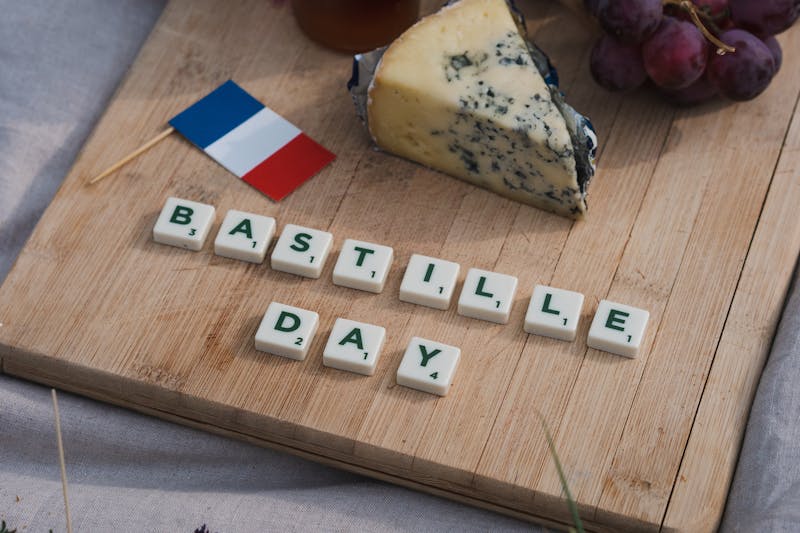Celebrating Holidays in French

Summer may not be the typical "holiday season", but there are certainly events to be celebrated. From Mother's Day to Independence Day, the summer months are full of reasons to celebrate. When you add in the fact that studying early means you'll already have the French vocabulary necessary to discuss winter holidays, it makes perfect sense to start studying now!
Holidays are celebrated in every language, every month of the year, and as a French language learner, you should know how to celebrate them all in your target language: French. No matter what your favorite holiday is or what holidays your family does and doesn't celebrate, knowing how to talk about them in French is important and should not be overlooked.

Why Learn French Holiday Vocab?
When studying French, you spend a lot of time focusing on grammar rules such as conjugation or on pronunciation and memorization. Whether you love grammar or you struggle with it, you can't spend all your time on it or you'll find it hard to stay motivated while learning.
Varying your study plan is a good way to prevent burnout and stay interested in learning a new language. The last thing you want to do is to wear yourself out or get so frustrated with French that you quit it. When you take the time to study something new and different, something that interests you, it can reignite that desire to learn and help you stay on track.
Even if it doesn't seem worthwhile to learn about holidays in French, it isn't for nothing. You may not realize it right now, but when the holiday rolls around, you'll find that you end up discussing it often. If you take the time now to study the vocab and familiarize yourself with holidays in French, you'll discover that the list of topics you feel comfortable discussing has greatly expanded and you'll know just what to say when the time comes!

Holidays in French
There are a lot of holidays and it would be impossible to include all of them in a single article. Instead, here are some of the most important and most widely celebrated holidays in France that you should know about and be able to discuss as a French learner.
#1. Bastille Day
Bastille Day is commonly known as and referred to as Le quatorze juillet, La fête nationale française, and Le jour de bastille. You can call it any name you want as all names are recognizable, but it's most commonly called Le quatorze juillet in conversation and La fête nationale française by the government.
Bastille Day is the French independence day and is celebrated across the country. If you happen to be in Paris for it, you'll find there are a lot of celebrations the night of and sometimes even in the days leading up to it. It's certainly worth checking out if you're planning a trip through France in July.
#2. Christmas
The word for Christmas in French is Noël and it's a very big celebration in France. You'll find marchés de noël (Christmas markets) throughout the country, but especially in the region of Alsace-Lorraine. Here, people also celebrate Boxing Day on December 26th, but it's called Le deuxième jour de Noël. This day is only celebrated in Alsace-Lorraine, though, so if you want to experience it, you'll need to plan your trip accordingly.
#3. Hannukah
Hannukah is also celebrated in France and the word for it in French is not all that different: Hanoucca. For Hannukah specific vocab, such as menorah and dreidel, check out this website with a list of Hannukah-related vocab in French.
#4. New Year's Day
New Year's is Le nouvel an in French and is often celebrated with parties and fireworks. It's not as big as it is in other countries, such as the United States, but if you want to celebrate it, you certainly won't have to look very hard to find a party.
#5. All Saints Day/Halloween
Halloween is not a big thing in France, but you can find some bars that put on Halloween-themed nights on October 31st. Fortunately, Halloween in French is exactly the same: l'Halloween. Simply say it with a French accent and you're set!
The day after Halloween is when the French really celebrate. All Saints Day, otherwise known as La Toussaint in French, is a very big holiday. It's a bank holiday and most universities give students several days or even a whole week off.
#6. Labor Day
In Europe, Labor Day is celebrated on May 1st and is also known as May Day. In French, it's called Le premier mai. It's also a bank holiday and is perhaps the biggest one of the year. In most cities, not even public transit will run on Le premier mai and if it does, the schedule is severely reduced.
#7. Armistice Day
Armistice Day, or Le jour d'armistice, is another big bank holiday in France. It celebrates the end of World War I and is also known as Remembrance Day by some countries. It's celebrated on November 1st every year.
#8. Victory in Europe (VE) Day
VE Day in French is known by many names: Le jour de la victoire, La fête du huitième mai, or Le jour de victoire en Europe. It isn't commonly celebrated outside of Europe, so some non-European French learners may not know about it before beginning their French language journey. It's an important holiday on the continent, though, so you'll want to remember it.
#9. Easter
As in many countries, Easter is celebrated both on Sunday and on Monday in France. In Alsace-Lorraine, it also includes Good Friday. Easter itself is Pâques while the Monday after is Lundi de pâques. If you're in Alsace-Lorraine, you'll need to also know that Good Friday in French is Le vendredi saint.
#10. Ramadan & Eid el Fitr
As with Halloween, both Ramadan and Eid el-Fitr remain the same in French: le Ramadan and L'Aïd el-fitr. Given the large Muslim population in France, it's important to know these holidays even if you aren't Muslim or don't celebrate them.

Holiday-Related French Vocab
Aside from specific holidays, there are some additional words or phrases in French that are useful when talking with French speakers about various holidays. Fortunately, this list isn't very long and these words/phrases are useful for more than just one day.
- Jour férié: If there's a holiday that is an official day off of work (ie. Bastille Day), then you would use the phrase un jour férié in reference to it.
- Le fête: If a holiday is religious and not an official holiday (ie. Christmas), then you would call it une fête.
- Les vacances: For a vacation, or holiday in the UK, you would say les vacances. Note that this word is always plural, even if you're only talking about one vacation or break.
- Le congé: If you're taking time off of work but it isn't because your work is closing for an official holiday, a religious holiday, or the summer holiday, then you would refer to this time-off as le congé.
- Passer les vacances: When you go on vacation or holiday, you would say that you passe les vacances. Again, this is always plural even if you're only talking about one.

Practice Your New French Vocabulary
Holiday vocab is very useful despite how it may feel at the time you're learning it. Who knows? Maybe one day, you'll find yourself in a French-speaking country during a holiday and this vocabulary will come to you naturally. If you are planning a trip to France or any other French-speaking region, here is some additional public transit vocab that will be useful in helping you get around with ease.
As with every new list of vocabulary words, be sure to practice and memorize your new French vocab so you don't forget it. Learning the words once won't help you remember them, even if you do have the tendency to remember things easily.
